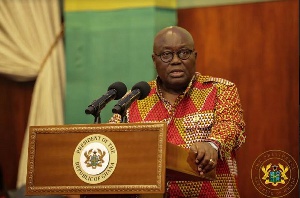The President of the Republic, Nana Addo Dankwa Akufo-Addo, has stated clearly that the ban on galamsey, i.e. illegal mining, has not been lifted, and will not be lifted.
According to President Akufo-Addo, it is the ban on legitimate small-scale mining that has rather been lifted, explaining that the ban on small-scale mining was never intended to be permanent.
“It was to enable Government fashion a policy that would sanitise the sector, and ensure that, in future, small-scale mining, which has been with us for centuries, would not damage our environment. The measures announced last Friday do exactly that,” the President said.
He continued, “I cannot, and will not, give up on the fight to protect our environment. I entreat the media and all well-intentioned Ghanaians to continue to join the fight to protect our lands and water bodies.”
President Akufo-Addo made this known on Wednesday, 19th December, 2018, when he addressed members of the media at an end of year press conference, at Jubilee House, Accra.
With the protection of the environment uppermost in Government’s considerations, as it seeks to bring rapid development to the people, the President noted that one thousand (1,000) units of 10-seater water closet institutional toilets with mechanized boreholes are currently under construction around the country.
Additionally, one thousand (1,000) community-based limited solar powered mechanized water systems are being constructed, with each constituency getting a minimum of three of these institutional toilets and water systems under the Special Development Initiatives and the Development Authorities.
“I notice that there is room for constituency priority infrastructure needs, under which the constituencies pick what they identify as their priority need. I believe there is a lesson in there for all of us by simply taking a look at the diversity of priority needs: community centres, police posts, street lights, culverts etc,” he added.
Abundance of food
Touching on agriculture, the President noted that, for the first time in many years, there is an abundance of food on the market, coupled with low prices of foodstuffs, and, in some cases, there is a glut.
“We are currently exporting plantain to some of our neighbours. Quite a turnaround from when I was lamenting two years ago that we were importing plantains from Cote d’Ivoire. We also did not import a single grain of maize this year,” he added.

President Akufo-Addo noted that it is not often that the country receives such good news, “and it must mean if you invest in agriculture, you get results. ‘Planting for Food and Job’ is working, and I look forward to rice joining the list of foodstuffs we are no longer importing.”
Additionally, the President stated that radical measures are being taken to establish a solid infrastructure for agriculture, with the imminent availability of significant numbers of tractors and the enhancement of Agricultural Mechanisation Centres, the construction of 80 warehouses this year for the storage of surplus food, the revival of the National Food and Buffer Stock Company, and the recent establishment of the Commodities Exchange.
All these, he said, are being done to modernize and transform Ghanaian agriculture to serve as a major growth pole for the economy.
Despite the dramatic decline in the world market prices for cocoa, President Akufo-Addo indicated that Government maintained the producer price paid to farmers as a sign of commitment to them.
“We are on course to realizing the 1 million tonne mark for our cocoa production, and seeing to the increasing domestic processing of the product. Our alliance with Cote d’Ivoire, to change the dynamics of the global cocoa industry, is also on course to enable us, the producers, obtain an increasing share of the industry’s value chain. It is good news for our farmers,” he added.
General News of Wednesday, 19 December 2018
Source: Jubilee House
'Ban on illegal mining not lifted' – President Akufo-Addo
Business
















